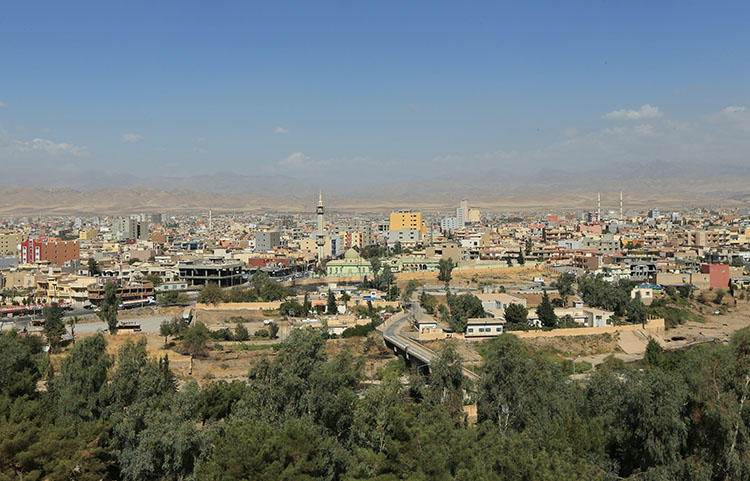Kurdish Asayish security forces detained William Bnyameen Adam, an Assyrian journalist, for 13 days after the contributor to the California-based broadcaster Assyrian National Broadcasting (ANB) returned from a two-week assignment in northern Syria, the journalist told CPJ. The journalist said that security forces confiscated his equipment, beat him, and questioned him about his reporting.
Asayish security forces arrested Bnyameen at a checkpoint run by the Kurdish Army, also known as peshmerga, on the outskirts of the northwestern Iraqi city of Zakho, on October 31, 2019, according to the Assyrian rights group, Assyrian Policy Institute, the Iraqi press freedom group Press Freedom Advocacy Association in Iraq, and Bnyameen, who shared an account of his detention with CPJ via email a day after his release.
Bnyameen told CPJ that before leaving for Syria on October 15, he applied for permission to enter the country from the Asayish-run Office of Relations at the Faysh Khabur border crossing. He said his application was rejected on the basis that Kurdish authorities do not recognize ANB as an authorized media outlet.
Zaya Yaro, a board member for ANB, told CPJ that the broadcaster doesn’t have permission from Kurdish authorities to operate in the Kurdish region in northern Iraq, despite repeated attempts to register and obtain a license.
Bnyameen, who also reports for the news website Alap, said that he spent 12 days reporting in Qamishli and Khabour, before trying to return to Iraq via a smuggler. On October 31, a smuggler led Bnyameen and about 30 Syrian Kurds into a Kurdish region in northern Iraq and took them to a checkpoint manned by peshmerga. While at the checkpoint, Asayish security forces arrived and asked him about his reason for travelling to Syria, Bnyameen said.
The journalist said that during questioning an Asayish officer struck him. Bnyameen added that he was handcuffed and blindfolded, and that security forces seized his cell phone, laptop, camera, voice recorder, and hard drive, and forced him to provide his passwords.
Bnyameen told CPJ he was moved to Sahela Prison, near Zakho, where he was kept incommunicado for three days. Bnyameen said he was accused of being a member of the militant group Islamic State and was interrogated about his trip to Syria and his relationship with the People’s Protection Units (YPG). Bnyameen said that when he denied ties to the YPG, Asayish officers beat him and threatened him with torture. Bnyammen said they also interrogated him about his political affiliations.
On November 4, the security forces transferred Bnyammen to a detention facility in the city of Duhok, where Asayish officers interrogated him again about his political affiliation, his criticism of Kurdish authorities, his reporting for the news website Alap, and his relations with political dissidents and Iraq-based Assyrian political parties opposed to the ruling KDP. He was forced to fingerprint documents that he couldn’t read, Bnyameen told CPJ.
On November 5, the journalist was allowed to phone his family and two days later his mother was allowed to visit him at the detention center, in the presence of a security guard. Guards instructed him to not mention the interrogations, the journalist said.
On November 7, Bnyammen was brought before a judge, who asked about the trip to Syria and the smuggler. The judge filed no charges, Bnyameen said. The same day, he was transferred to Zirka Prison in Duhok.
His lawyer, Benyamin Issa, visited on November 12, and informed him that a request for his conditional release had been denied twice, Bnyameen said.
On November 12, Bnyameen was released and his belongings were returned to him. He told CPJ he still doesn’t know if charges are pending and he said that he believes he was targeted because of his work and his criticism of the Kurdish authorities.
Dindar Zebari, the Kurdistan Regional Government’s deputy minister for international advocacy coordination, told CPJ in an email on November 12, 2019 that he would look into the arrest and let CPJ know his findings. Zebari told CPJ via email on November 27 that Bnyameen was arrested for crossing the border illegally from Syria and that his case is ongoing. Zebari said that Bnyameen “did not cross to Syria for journalism and reporting activities” and that the Asayish security forces had informed his office that the journalist was not beaten or tortured during questioning.
ANB board member Yaro told CPJ that Bnyameen has been contributing as a freelancer to ANB since 2014 and had been on assignment in Syria for two weeks, reporting on the situation for the Assyrian minority in Qamishli and villages near al-Hasakah. Bnyameen told CPJ that he interviewed local Assyrian politicians and civilians for a documentary and documented the situation for the Assyrians.
Bnyameen previously received threatening phone calls from members of the ruling KDP in July 2019 for criticizing on Facebook the appointment of two Assyrians to senior government positions, according to the Assyrian Policy Institute. The institute did not provide further details of who allegedly made the calls. A relative of Bnyameen’s, who spoke with CPJ on condition of anonymity, said that the journalist had received threats recently.
The KDP media office did not immediately reply to CPJ’s email request for comment about the threatening calls allegedly made by KDP members.
[Editor’s note: The thirteenth paragraph has been updated to include a response from Dindar Zebari, the Kurdistan Regional Government’s deputy minister for international advocacy coordination.]
